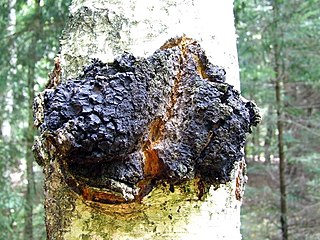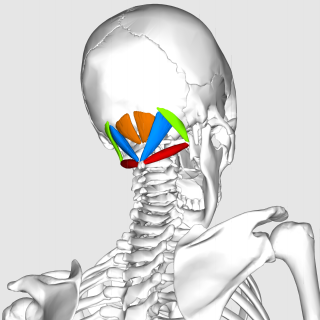
The suboccipital nerve is the dorsal primary ramus of the first cervical nerve (C1). It exits the spinal cord between the skull and the first cervical vertebra, the atlas.

The greater occipital nerve is a nerve of the head. It is a spinal nerve, specifically the medial branch of the dorsal primary ramus of cervical spinal nerve 2. It arises from between the first and second cervical vertebrae, ascends, and then passes through the semispinalis muscle. It ascends further to supply the skin along the posterior part of the scalp to the vertex. It supplies sensation to the scalp at the top of the head, over the ear and over the parotid glands.

The obliquus capitis inferior muscle is a muscle in the upper back of the neck. It is one of the suboccipital muscles. Its inferior attachment is at the spinous process of the axis; its superior attachment is at the transverse process of the atlas. It is innervated by the suboccipital nerve. The muscle rotates the head to its side.

The obliquus capitis superior muscle is a small muscle in the upper back part of the neck. It is one of the suboccipital muscles. It attaches inferiorly at the transverse process of the atlas ; it attaches superiorly at the external surface of the occipital bone. The muscle is innervated by the suboccipital nerve.

The vastus medialis is an extensor muscle located medially in the thigh that extends the knee. The vastus medialis is part of the quadriceps muscle group.

The crest of the ilium is the superior border of the wing of ilium and the superiolateral margin of the greater pelvis.

The timberman beetle is a species of woodboring beetle belonging to the longhorn beetle family.

Otodus is an extinct, cosmopolitan genus of mackerel shark which lived from the Paleocene to the Pliocene epoch. The name Otodus comes from Ancient Greek ὠτ- and ὀδούς – thus, "ear-shaped tooth".

The anterior divisions of the seventh, eighth, ninth, tenth, and eleventh thoracic intercostal nerves are continued anteriorly from the intercostal spaces into the abdominal wall; hence they are named thoraco-abdominal nerves.

Inonotus obliquus, commonly called chaga, is a fungus in the family Hymenochaetaceae. It is parasitic on birch and other trees. The sterile conk is irregularly formed and resembles burnt charcoal. It is not the fruiting body of the fungus, but a sclerotium or mass of mycelium, mostly black because of a great amount of melanin. Some people consider chaga medicinal.

The posterior branches of cervical nerves branch from the dorsal rami of the cervical nerves.

The suboccipital muscles are a group of muscles defined by their location to the occiput. Suboccipital muscles are located below the occipital bone. These are four paired muscles on the underside of the occipital bone; the two straight muscles (rectus) and the two oblique muscles (obliquus).
Acanthocinus henschi is a species of longhorn beetles of the subfamily Lamiinae. It was described by Reitter in 1900, and is known from Austria, Croatia, Italy, and Macedonia. The beetles measure 7-11 millimetres in length, and live for approximately 1–2 years. They inhabit trees in the species Pinus nigra.
Acanthocinus leechi is a species of longhorn beetles of the subfamily Lamiinae. It was described by Lawrence S. Dillon in 1956.

Acanthocinus nodosus is a species of longhorn beetles of the subfamily Lamiinae. It was described by Johan Christian Fabricius in 1775.

Acanthocinus princeps, the ponderosa pine bark borer, is a species of longhorn beetle of the subfamily Lamiinae. It was described by Francis Walker in 1866.

Acanthocinus pusillus is a species of longhorn beetles of the subfamily Lamiinae. It was described by William Kirby in 1837.

Acanthocinus spectabilis is a species of longhorn beetles of the subfamily Lamiinae. It was described by John Lawrence LeConte in 1854.
Adductor obliquus may refer to:
Obliquus capitis muscle may refer to:















